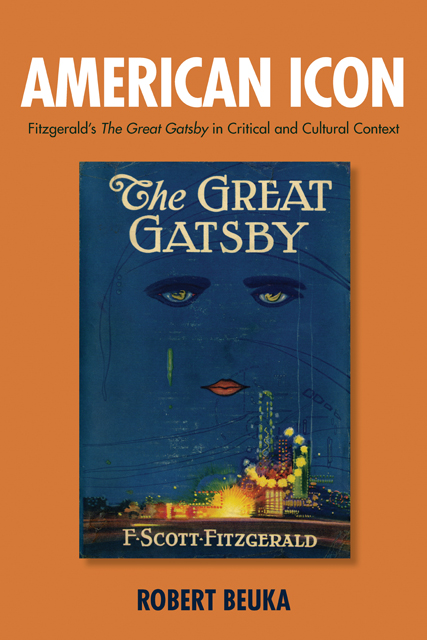Book contents
- Frontmatter
- Dedication
- Contents
- Preface
- 1 A Book of the Season Only: Early Reactions to The Great Gatsby
- 2 A Green Light: The “Fitzgerald Revival” and the Making of a Masterpiece, 1940–59
- 3 The Gatsby Industry: Tracing Patterns and Pushing Boundaries in the Criticism of the Sixties and Seventies
- 4 Gatsby, in Theory (and Out): New Paradigms in the Eighties and Nineties
- 5 Twenty-First-Century G: The Great Gatsby as Cultural Icon
- Works Cited
- Index
4 - Gatsby, in Theory (and Out): New Paradigms in the Eighties and Nineties
Published online by Cambridge University Press: 11 February 2023
- Frontmatter
- Dedication
- Contents
- Preface
- 1 A Book of the Season Only: Early Reactions to The Great Gatsby
- 2 A Green Light: The “Fitzgerald Revival” and the Making of a Masterpiece, 1940–59
- 3 The Gatsby Industry: Tracing Patterns and Pushing Boundaries in the Criticism of the Sixties and Seventies
- 4 Gatsby, in Theory (and Out): New Paradigms in the Eighties and Nineties
- 5 Twenty-First-Century G: The Great Gatsby as Cultural Icon
- Works Cited
- Index
Summary
A Sense of the Past: Situating Gatsby
If the period from the end of World War II to the end of the fifties saw the dramatic rise of The Great Gatsby from neglected novel to celebrated American masterpiece, and if the sixties and seventies saw the further canonization of Gatsby in particular and the rise of Fitzgerald studies in general, the eighties and nineties would see Gatsby criticism turn in new directions yet again. This period lacks the dramatic arc of the previous four decades (after all, the battle for recognition of Gatsby as a great American novel had long since been won, and seemingly every conceivable image pattern and narrative nuance had been traced, and an endless supply of interpretations on the novel’s mythic, historic, and romantic themes — some vital and illuminating, some not — been offered). Nonetheless, as the institution of literary studies took a major turn toward new theoretical models in the United States in the eighties (following the lead of European literary critics from the sixties and seventies), not only would new works be considered as part of the canon of the nation’s literature, but the accepted classics would be reinterpreted from new angles. Hence, it would turn out that all had not, in fact, been said about Gatsby back in the glory days of the tweed-jacketed English professor. A new generation of scholars, informed by poststructuralist, new historicist, and narratological theories, would consider the novel from a range of new perspectives.
To be sure, some studies mined familiar territory while finding some new ways to contribute to the ongoing discourse on the novel. Brian Way’s 1980 book F. Scott Fitzgerald and the Art of Social Fiction eschewed the mythic and archetypal approaches of the past and focused instead on Fitzgerald as a social realist. While Way considers this a much needed corrective to a superabundance of material focusing on the overarching American themes (and one cannot deny that, by 1980, he had a point there), still his study, with its focus on manners and class issues in Fitzgerald’s work, is not as groundbreaking as he may have thought. Nonetheless, his chapter on The Great Gatsby does touch on an aspect of the novel surprisingly neglected in much of the critical work — the book’s sense of humor.
- Type
- Chapter
- Information
- American IconFitzgerald's <i>The Great Gatsby</i> in Critical and Cultural Context, pp. 93 - 117Publisher: Boydell & BrewerPrint publication year: 2011



